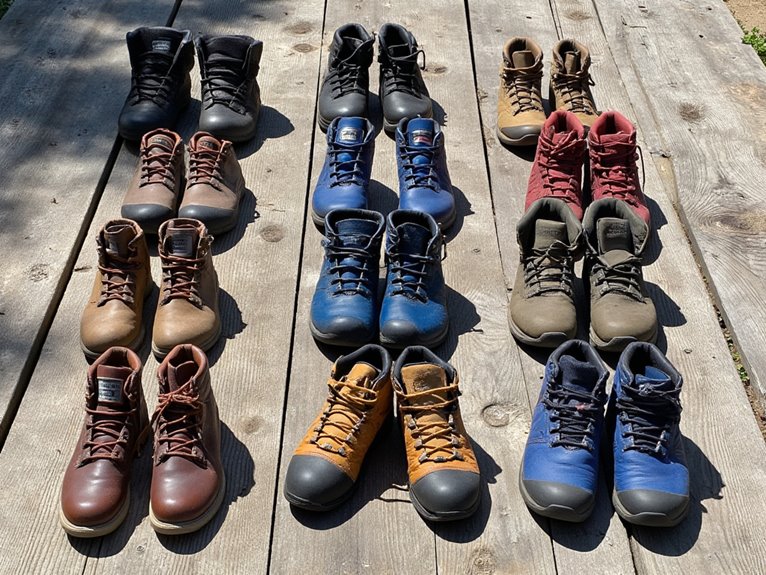10 Best Protein Bars for Hiking That Will Fuel Your Adventure
For hiking fuel, I recommend CLIF BAR Variety Packs with 9-11g protein and organic oats, KIND Protein MAX bars delivering 20g protein with minimal sugar, and RXBAR’s 12g protein from whole ingredients. CLIF BUILDERS provide 20g complete plant-based protein for extended trips, while PROBAR MEAL bars offer 370 calories for serious energy demands. Nature Valley Chewy bars balance 10g protein with whole grains at moderate price points. Below you’ll find detailed specifications and performance comparisons for ideal trail nutrition.
We are supported by our audience. When you purchase through links on our site, we may earn an affiliate commission, at no extra cost for you. Learn more. Last update on 25th November 2025 / Images from Amazon Product Advertising API.
Notable Insights
- Choose protein bars with 10-20 grams of protein and 200-300 calories for sustained energy during hiking adventures.
- CLIF BAR and KIND Protein MAX offer reliable options with organic ingredients and high protein content.
- Prioritize bars with non-GMO, whole food ingredients like nuts, oats, and dried fruits over artificial additives.
- Select bars with sturdy, puncture-resistant packaging to prevent wrapper tearing during outdoor activities.
- Consider individual taste preferences and any digestive sensitivities when choosing between plant-based or whey protein options.
CLIF BAR Protein Bars – Crunchy Peanut Butter (15 Pack)
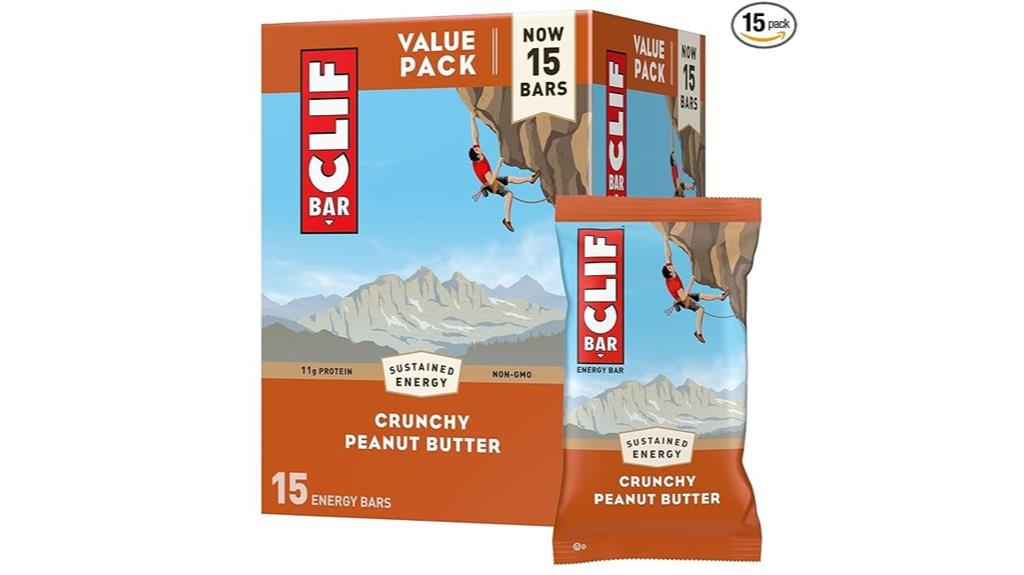
Sustained energy demands during multi-hour hikes require fuel that won’t leave you crashing mid-trail, and CLIF BAR’s Crunchy Peanut Butter variant delivers 11 grams of plant-based protein alongside complex carbohydrates from organic rolled oats. You’ll get sustained energy from the balanced protein-fat-carbohydrate ratio. The non-GMO formula contains no high-fructose corn syrup.
These bars maintain their nutritional integrity through LEED-certified production facilities powered by renewable energy sources. You can count on consistent texture and flavor, though occasional wrapper adherence may occur in high temperatures without affecting taste. Regular hikers report sustained satiation during extended activities. The 15-pack format provides bulk value for frequent trail use.
Best For: Athletes, hikers, cyclists, and active individuals who need sustained energy during moderate to high-intensity activities and prefer plant-based nutrition without artificial additives.
Pros:
- Provides 11g of plant-based protein with complex carbohydrates from organic rolled oats for sustained energy without crashes
- Non-GMO formula with no high-fructose corn syrup, made in LEED-certified facilities using renewable energy
- 15-pack bulk format offers value for frequent users with consistent taste and texture that keeps you full during extended activities
Cons:
- Bars may occasionally stick to wrapper in high temperatures, though taste remains unaffected
- Higher price point compared to conventional energy bars due to organic and sustainable production methods
- May not provide enough protein for very high-intensity training or muscle-building focused nutrition needs
CLIF BAR Variety Pack Energy Bars (12 Pack)
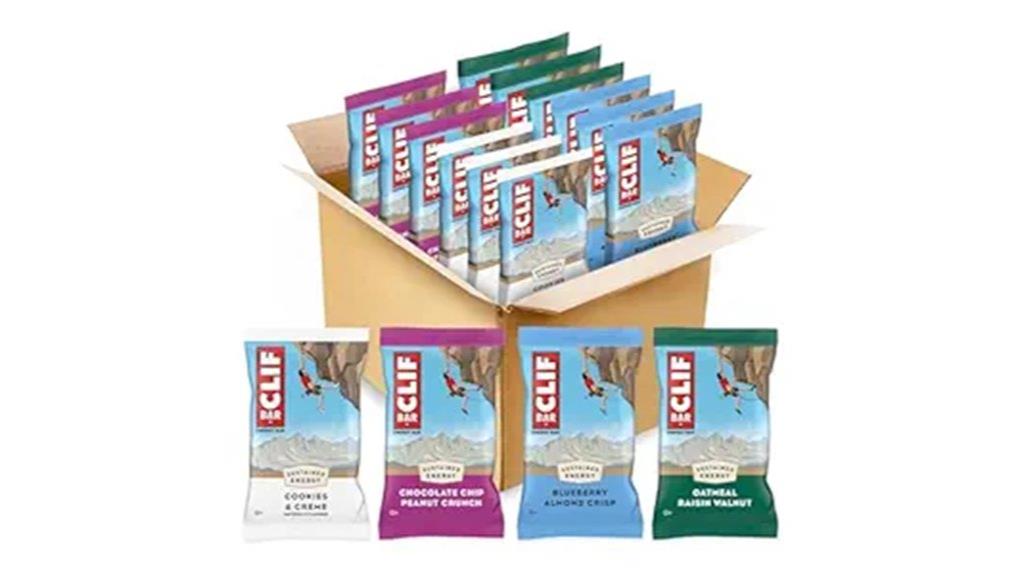
Outdoor enthusiasts seeking reliable fuel for extended adventures will find the CLIF BAR Variety Pack Energy Bars deliver consistent performance through four distinct flavor profiles. You’ll receive three bars each of Cookies & Creme, Chocolate Chip Peanut Crunch, Blueberry Almond Crisp, and Oatmeal Raisin Walnut. Each bar provides 10-11g of protein combined with organic rolled oats for sustained energy output. The non-GMO, plant-based formula excludes high-fructose corn syrup while balancing protein, fat, and carbohydrates for moderate-intensity activities. You’re supporting environmental sustainability since production occurs in LEED-certified facilities using renewable electricity sources.
Best For: Outdoor enthusiasts, athletes, and active individuals who need sustained energy during moderate-intensity activities like hiking, climbing, and biking, or those seeking convenient plant-based meal replacement options.
Pros:
- Four diverse flavors (3 bars each) provide variety while delivering 10-11g of protein and sustained energy from organic rolled oats
- Non-GMO, plant-based formula without high-fructose corn syrup offers a clean nutrition profile with balanced macronutrients
- Environmentally sustainable production in LEED-certified facilities using renewable electricity sources
Cons:
- Mixed customer feedback on specific flavor preferences and taste satisfaction
- Some customers report disappointment with bar size relative to expectations
- Limited to only 12 bars total, which may not provide long-term value for frequent consumers
KIND Protein MAX Crispy Chocolate Peanut Butter Snack Bars (4 Count Box)
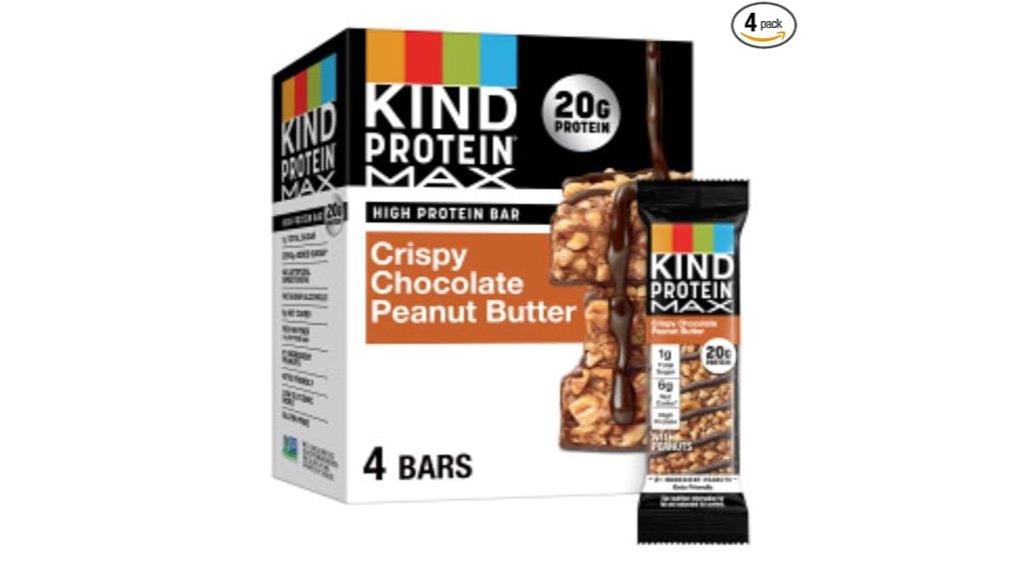
KIND Protein MAX Crispy Chocolate Peanut Butter Snack Bars deliver 20 grams of protein per serving, making them ideal for hikers who need substantial fuel without the sugar crash. Each 250-calorie bar contains only 1 gram total sugar and zero added sugar, supporting steady energy levels on long trails. The 14 grams of fat per bar provide sustained satiation during extended outdoor activities.
These gluten-free bars feature peanuts as the primary ingredient, delivering high fiber content alongside quality protein. The individually wrapped format guarantees freshness in your pack while preventing moisture damage. However, some hikers experience digestive sensitivity to allulose, an ingredient used in these bars. The keto-friendly formulation works well for low-carb hiking nutrition plans, though taste preferences vary among users.
Best For: Hikers and active individuals seeking high-protein, low-sugar snack bars that provide sustained energy without compromising their keto or gluten-free dietary requirements.
Pros:
- High protein content (20g) with zero added sugar and only 1g total sugar for sustained energy without sugar crashes
- Convenient individually wrapped format that maintains freshness and prevents moisture damage during outdoor activities
- Keto-friendly and gluten-free formulation with real peanut butter and nutrient-dense ingredients
Cons:
- Some users experience digestive issues due to allulose ingredient sensitivity
- Mixed consumer feedback regarding taste preferences, with some finding alternatives more appealing
- Price discrepancies between different packaging sizes can create confusion when purchasing
Nature Valley Chewy Granola Bars, Protein Variety Pack (15 ct)
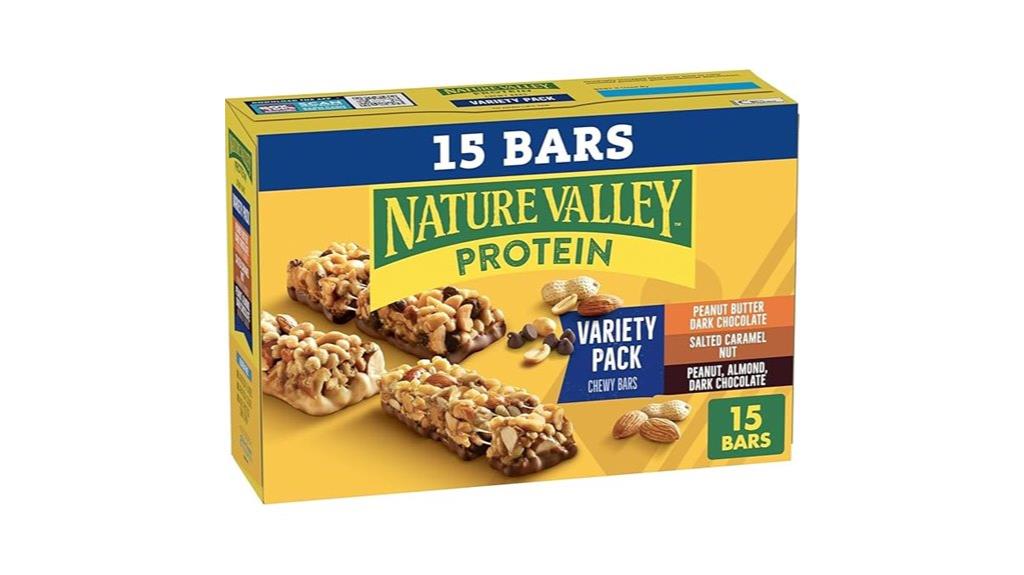
When you need portable protein that won’t weigh down your pack, Nature Valley’s Chewy Granola Bars deliver 10 grams per serving across three distinct flavors. This 15-count variety pack weighs 21.3 ounces total and includes five bars each of Peanut Butter Dark Chocolate, Salted Caramel Nut, and Peanut Almond Dark Chocolate.
The bars contain whole grain oats as their foundation, providing sustained energy release during extended hikes. You’ll find no artificial flavors, colors, or high fructose corn syrup in the ingredient list. The gluten-free formulation makes these suitable for hikers with dietary restrictions.
Customer feedback consistently highlights their filling nature and taste quality, making them effective for morning fuel or mid-trail snacks.
Best For: Hikers, busy professionals, and fitness enthusiasts who need a convenient, high-protein snack that’s gluten-free and made with whole grain oats.
Pros:
- High protein content at 10 grams per serving provides sustained energy for active lifestyles
- No artificial flavors, colors, or high fructose corn syrup with gluten-free formulation
- Three distinct flavors in one variety pack offer taste diversity for different preferences
Cons:
- Higher price point compared to standard granola bars may not fit all budgets
- Potential delivery issues include damaged packaging and short expiry dates when ordered online
- Some customers report receiving stale products, indicating possible quality control concerns
CLIF BUILDERS Protein Bars – Chocolate Peanut Butter (12 Count)
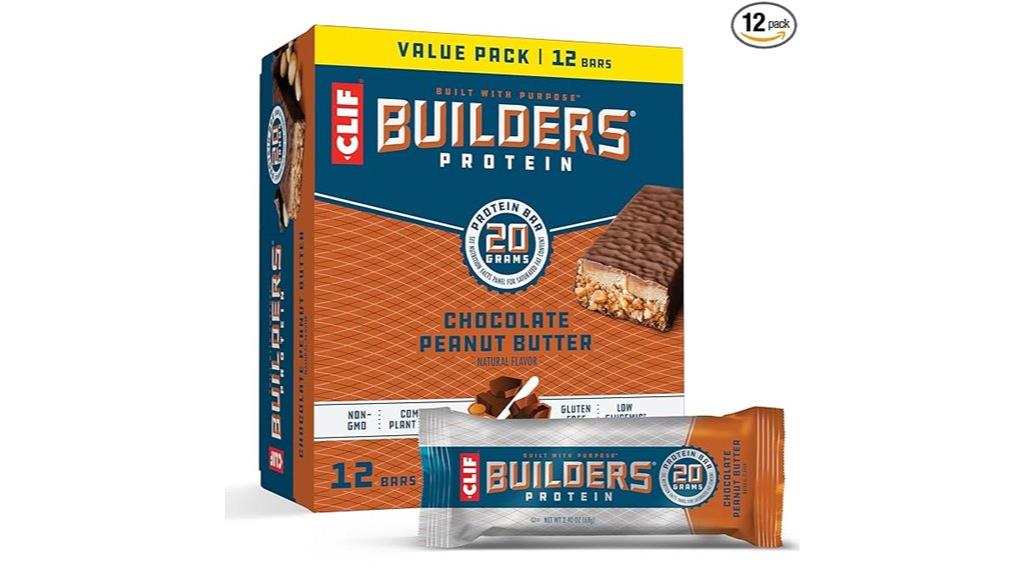
The CLIF BUILDERS Protein Bar in Chocolate Peanut Butter delivers 20 grams of complete plant-based protein, making it an ideal choice for hikers who follow vegan diets or prefer plant-sourced nutrition. The bars contain essential amino acids that support muscle repair during multi-day treks.
You’ll appreciate the gluten-free, non-GMO formulation that excludes artificial sweeteners and high-fructose corn syrup. The low glycemic profile provides sustained energy release rather than quick spikes.
The chocolate peanut butter combination offers smooth texture without the grittiness common in protein bars. Individual wrapping guarantees freshness in your backpack.
These bars function effectively for both pre-hike fueling and post-activity recovery. Their portable design fits standard pack pockets while delivering complete nutrition for extended outdoor adventures.
Best For: Vegan hikers and outdoor enthusiasts seeking complete plant-based protein for sustained energy and muscle recovery during extended activities.
Pros:
- Delivers 20g of complete plant-based protein with essential amino acids for effective muscle repair and recovery
- Gluten-free, non-GMO formulation without artificial sweeteners provides clean, sustained energy with low glycemic impact
- Individually wrapped for freshness with smooth chocolate peanut butter taste that avoids the gritty texture of many protein bars
Cons:
- Mixed customer feedback regarding flavor intensity and overall texture satisfaction
- Some users report potential gastrointestinal effects from the vegan protein source
- Limited to one flavor option in this specific product offering
Pure Protein Bars, Chocolate Peanut Butter (12 Count)
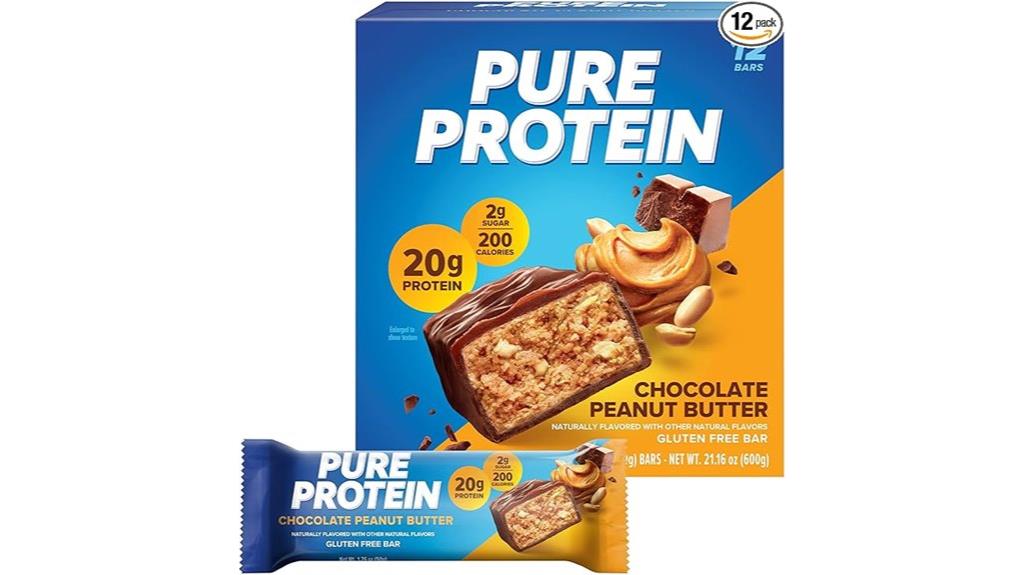
Pure Protein Bars in Chocolate Peanut Butter deliver 20 grams of whey protein isolate in a compact 1.76-ounce package, making them ideal for hikers who need efficient muscle fuel without carrying excess weight.
You’ll consume only 200 calories and 2 grams of sugar per bar. This nutritional profile supports lean muscle maintenance during extended hikes. The gluten-free formula uses whey protein isolate, which absorbs quickly for rapid muscle recovery.
The soft texture won’t freeze solid in cold conditions like harder bars. You can eat these pre-hike for sustained energy or post-hike for muscle repair. The chocolate peanut butter flavor provides familiar taste without excessive sweetness.
Each 12-count box costs less than retail alternatives. You’ll appreciate the consistent protein content across all bars in the package.
Best For: Hikers, athletes, and active individuals who need convenient, high-protein snacks for muscle fuel and recovery during workouts or outdoor activities.
Pros:
- High protein content (20g) with low sugar (2g) and moderate calories (200) supports lean muscle maintenance
- Soft texture remains edible in cold conditions and gluten-free formula with whey protein isolate absorbs quickly
- More affordable than retail alternatives with consistent protein content across all bars in the package
Cons:
- Some customers report packaging and shipping issues that may affect product quality upon delivery
- Texture variability between bars and subjective flavor preferences may not satisfy all users
- Limited to 12-count boxes which may not provide enough variety for those wanting multiple flavors
PROBAR MEAL Bar, Superfood Slam, Gluten-Free & Plant-Based (12 Count)
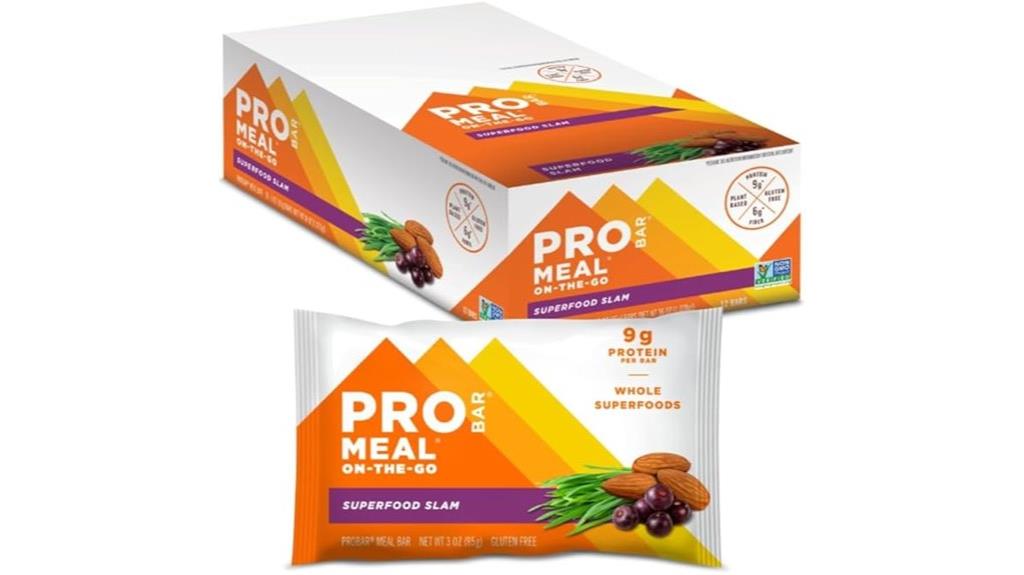
PROBAR MEAL Bars deliver 370 calories per serving, making them ideal for hikers who need substantial energy replacement during extended outdoor adventures. You’ll get 9 grams of plant-based protein and 6 grams of fiber from ingredients like oats, peanut butter, dates, and sunflower seeds.
These bars function as actual meal replacements rather than light snacks. The dense formulation includes organic brown rice syrup, acai powder, and flax seeds for sustained energy release. You’ll appreciate the gluten-free, soy-free formula that’s Non-GMO Project Verified.
The Superfood Slam flavor combines wholesome ingredients without artificial additives. Pair these bars with fresh fruit for enhanced nutrition during long hikes.
Best For: Hikers, outdoor enthusiasts, and active individuals who need a substantial, plant-based meal replacement that provides sustained energy and nutrition on-the-go.
Pros:
- High calorie density (370 calories) with 9g plant-based protein and 6g fiber for sustained energy during extended activities
- Clean ingredients that are gluten-free, soy-free, Non-GMO Project Verified, and made with whole-food components like oats, peanut butter, and dates
- Functions as an actual meal replacement rather than just a snack, making it ideal for hiking, traveling, or emergency food situations
Cons:
- Dense texture and substantial size may be too heavy for those seeking a light snack option
- Higher calorie content may not suit those looking for lower-calorie nutrition bars
- Limited to specific dietary preferences as it contains nuts and may not appeal to those preferring traditional protein bar flavors
RXBAR Protein Bars, Snack Bars, Variety Pack (10 Count)
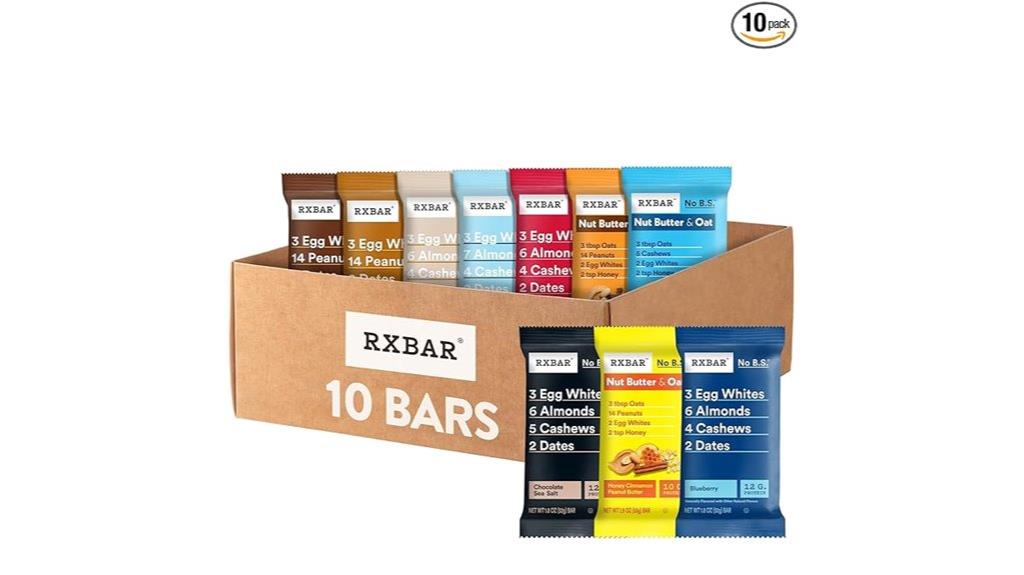
RXBAR Protein Bars deliver 12 grams of complete protein per serving through a combination of egg whites, nuts, and dates—making them ideal for hikers who need sustained energy without artificial additives. The variety pack contains 10 bars across seven standard flavors plus three nut butter variations. Each bar provides approximately 200+ calories with significant fiber content.
You’ll find the texture dense and chewy—comparable to a thick brownie consistency. The bars won’t cause digestive upset during physical activity. Their simple ingredient profile eliminates gluten and artificial sweeteners that can trigger stomach issues on trails. The natural date sweetness satisfies sugar cravings without energy crashes. Multiple flavors prevent taste fatigue during multi-day hikes.
Best For: Athletes, hikers, and active individuals seeking sustained energy from whole food ingredients without artificial additives or gluten.
Pros:
- Contains 12 grams of complete protein from egg whites, nuts, and dates with high fiber content for sustained energy
- Simple ingredient profile eliminates gluten and artificial sweeteners, reducing risk of digestive upset during physical activity
- Variety pack with 10 different flavors prevents taste fatigue and allows users to find preferred options
Cons:
- Dense, chewy texture can be sticky and may not appeal to those preferring lighter snack bars
- High caloric density at 200+ calories per bar may not suit those watching calorie intake
- Natural date sweetness may still be too sweet for some users despite being from whole food sources
Factors to Consider When Choosing a Protein Bar for Hiking
When I’m selecting a protein bar for your hiking adventures, I focus on five critical factors that determine whether a bar will enhance or hinder your trail performance. Your protein requirements typically range from 15-20 grams per bar to support muscle recovery, while calorie density should hit 200-300 calories per ounce to maximize energy without excess pack weight. I’ll examine how shelf stability affects nutritional integrity in temperature extremes, evaluate packaging durability against trail conditions, and assess ingredient quality standards that impact both digestibility and sustained energy release.
Protein Content Requirements
Although protein bars vary widely in their nutritional profiles, targeting 10-20 grams of protein per bar provides the ideal foundation for sustained hiking performance. This range delivers adequate amino acids for muscle support during prolonged physical exertion without overwhelming your digestive system on the trail.
I recommend calculating your protein needs based on activity duration and intensity. For day hikes under six hours, bars containing 10-15 grams suffice. Extended backpacking trips require the higher end at 15-20 grams per bar. This protein content supports muscle recovery between climbing sections and maintains energy output during sustained elevation gains.
Quality protein sources matter greatly. Look for bars featuring whey, casein, or plant-based proteins like pea or hemp. These deliver complete amino acid profiles essential for muscle function during demanding terrain navigation.
Calorie Density Needs
Calorie density becomes your primary fuel gauge on extended hiking adventures, determining whether you’ll maintain consistent energy output or experience performance drops during challenging terrain. I recommend targeting protein bars with 200-300 calories per serving for ideal energy delivery. This range provides sufficient fuel without excessive weight in your pack.
Higher calorie densities offer maximum energy per ounce carried. A 250-calorie bar weighing 2 ounces delivers 125 calories per ounce—an efficient fuel-to-weight ratio. Lower-calorie options under 200 calories won’t sustain energy demands during strenuous climbs or long-distance treks.
Calculate your hourly calorie burn rate, typically 300-600 calories per hour depending on terrain difficulty and body weight. Match your bar selection to these energy expenditure requirements for sustained performance throughout your hiking adventure.
Shelf Stability Considerations
Beyond calorie content, your protein bar’s ability to withstand temperature extremes and extended storage directly impacts your hiking nutrition strategy. Most protein bars expire within 12 weeks, making freshness critical for multi-day expeditions. I recommend selecting individually wrapped bars to prevent contamination and maintain product integrity during transport.
Natural ingredients typically provide superior shelf stability compared to artificial additives. Bars formulated without refrigeration requirements perform better in backcountry conditions where cooling isn’t available. The packaging must withstand temperature fluctuations without compromising the bar’s structure or causing melting.
Robust wrapper materials protect against moisture infiltration and physical damage from pack compression. Check expiration dates before departure and rotate stock regularly. Minimal preservative formulations often demonstrate better long-term stability than heavily processed alternatives.
Packaging and Portability
Three critical packaging elements determine whether your protein bar survives the rigors of trail conditions: wrapper durability, weight efficiency, and access convenience.
I prioritize individually wrapped bars that resist punctures and moisture infiltration. Quality packaging withstands temperature fluctuations from freezing alpine conditions to desert heat without compromising seal integrity. The wrapper material must flex without tearing when compressed in your pack.
Weight matters considerably during multi-day treks. I select bars under 2.5 ounces with minimal packaging waste. Compact dimensions fit efficiently in side pockets without creating bulk.
Access design affects trail practicality. I choose wrappers that tear cleanly along perforated lines or feature easy-grip tabs. Resealable packages allow portion control during extended breaks. Avoid bars requiring scissors or excessive force to open, as these become problematic with cold fingers or limited dexterity.
Ingredient Quality Standards
When evaluating protein bars for hiking, I examine ingredient quality through five essential criteria that directly impact performance, digestibility, and nutritional value on the trail.
First, I prioritize non-GMO, plant-based ingredients for ideal health benefits. Second, I seek whole food components like organic rolled oats, nuts, and seeds that deliver sustained energy release. These ingredients provide complex carbohydrates and healthy fats essential for endurance activities.
Third, I target protein content between 9-20 grams per serving to support muscle maintenance during extended hikes. Fourth, I avoid bars containing high-fructose corn syrup and artificial additives, which compromise nutritional integrity and may cause digestive issues.
Finally, I choose products from environmentally responsible facilities using sustainable manufacturing practices, aligning nutrition choices with environmental stewardship.
Energy Release Duration
Sustained energy release becomes the determining factor between a successful hiking experience and midday fatigue crashes on challenging trails. I recommend protein bars containing balanced macronutrient profiles for ideal performance. Target bars with 9-11 grams of protein per serving to maintain satiety and energy stability during extended activities.
Ingredients matter greatly for energy duration. Organic rolled oats and nuts provide healthy fats that slow digestion, creating prolonged fuel availability. This combination prevents rapid glucose spikes that lead to energy crashes. I look for bars containing 10-14 grams of fat per serving for demanding hikes.
Lower glycemic index formulations deliver superior results for multi-hour adventures. These bars release energy gradually, matching your body’s consumption rate during moderate-intensity hiking. Choose products that emphasize complex carbohydrates over simple sugars for sustained performance.
Weather Resistance Factors
Extreme weather conditions can transform your carefully selected protein bar into an inedible mess or rock-hard disappointment within hours on the trail. I prioritize temperature-stable ingredients when selecting hiking nutrition. Certain bars melt above 80°F, while others become brittle below 40°F.
Individual wrapping provides essential protection against moisture and trail debris. I look for flexible, puncture-resistant packaging that won’t tear in backpack compartments. Sturdy wrappers maintain bar integrity during rough handling.
Extended shelf life prevents spoilage in remote locations. I choose bars with expiration dates exceeding six months for multi-day expeditions.
Low moisture content bars resist humidity absorption across varying weather conditions. They maintain firmness and texture regardless of atmospheric changes. This characteristic guarantees consistent performance from desert heat to mountain cold.
Weight to Nutrition Ratio
Every ounce counts when you’re carrying gear for miles, making weight-to-nutrition ratio the most critical factor in protein bar selection. I prioritize bars delivering at least 10g of protein per serving to guarantee substantial energy without pack burden. Target 200-250 calories per serving for peak caloric density while maintaining portability during extended hikes.
Nutrient-dense ingredients maximize nutritional return on weight investment. I focus on bars containing nuts, oats, and dried fruits—ingredients providing concentrated nutrition without excess mass. These components deliver essential fats, complex carbohydrates, and micronutrients efficiently.
Avoid bars with high weight but low nutritional density. Products loaded with empty calories fail to support sustained energy needs during demanding physical activity. Calculate grams of protein and total calories against bar weight to determine efficiency ratios before purchasing.
On a final note
I’ve analyzed the top protein bars that deliver essential nutrition for your hiking adventures. Each option provides specific protein content, carbohydrate ratios, and caloric density to match different trail demands. Consider your hike duration, weight restrictions, and dietary preferences when selecting bars. The CLIF, KIND, Pure Protein, PROBAR, and RXBAR varieties offer proven performance across various outdoor conditions. Choose bars that align with your energy requirements and taste preferences for ideal trail nutrition.




